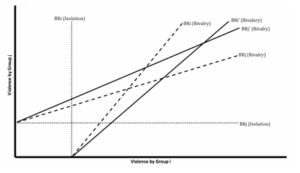Quantitative literature discussing violence in civil conflicts tends towards a typical model of engagement between governments and revolutionaries. Whilst recent work has shown the significant impact of multiple anti-government groups, a further feature remains understudied—the role of pro-state militants. This article theorizes a “violence premium” when such groups arise, which leads to all connected groups devoting greater energy to conflict than they would in isolation. Employing duration analysis and data from The Troubles in Northern Ireland, where Republicans act as revolutionary insurgents, Loyalists as pro-state militants, and the British Army as government forces, the violence premium is empirically confirmed. Both Loyalists and Republicans deviate from their underlying strategies to attack more frequently when violence by their rivals increases, with Republicans and the British Army engaging in the same way. An extended analysis, accounting for the status of the victim, shows that the violence premium resulting from interaction between Loyalists and Republicans targeted only the civilian population of Northern Ireland, elucidating the sectarian component of The Troubles. These results show that including all conflict parties and considering how they are linked are important features in studies that aim to determine the net level of violence in civil conflicts.
Publication Details
- Year of Publication: 2017
- Region/s: Europe
- Theme/s: Violence & Peacebuilding
- Research Topic/s: Conflict Measurement · Violence & Conflict
- Method/s: Panel Data Analysis · Spatial Data Analysis
- DOI: https://doi.org/10.1080/09546553.2015.1035368




